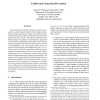Free Online Productivity Tools
i2Speak
i2Symbol
i2OCR
iTex2Img
iWeb2Print
iWeb2Shot
i2Type
iPdf2Split
iPdf2Merge
i2Bopomofo
i2Arabic
i2Style
i2Image
i2PDF
iLatex2Rtf
Sci2ools
WETICE
2007
IEEE
2007
IEEE
Collaborative Intrusion Prevention
Intrusion Prevention Systems (IPSs) have long been proposed as a defense against attacks that propagate too fast for any manual response to be useful. In an important class of IPSs, the host-based IPSs, honeypots are used to collect information about attacks. The collected information will then be analyzed to generate countermeasures against the observed attack. Unfortunately, these IPSs can be rendered useless by techniques that allow the honeypots in a network to be identified ([1, 9]). In particular, attacks can be designed to avoid targeting the identified honeypots. As a result, the IPSs will have no information about the attacks, and thus no countermeasure will ever be generated. The use of honeypots is also creating other practical issues which limit the usefulness/feasibility of many host-based IPSs. We propose to solve these problems by duplicating the detection and analysis capability on every protected system; i.e., turning every host into a honeypot. In this paper, we wi...
Emerging Technology | Host-based Ipss | Intrusion Prevention | Intrusion Prevention Systems | WETICE 2007 |
Related Content
| Added | 04 Jun 2010 |
| Updated | 04 Jun 2010 |
| Type | Conference |
| Year | 2007 |
| Where | WETICE |
| Authors | Simon P. Chung, Aloysius K. Mok |
Comments (0)

